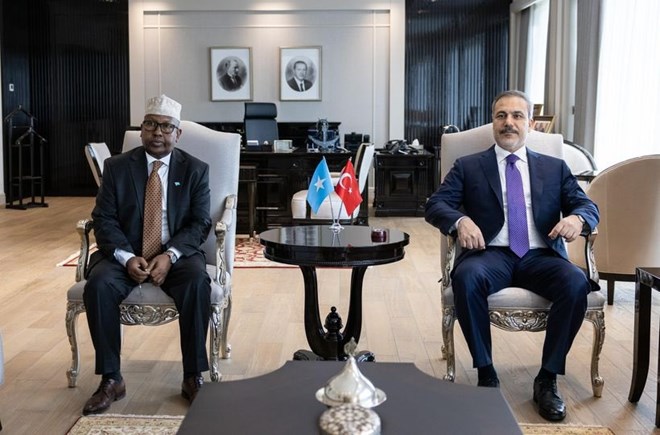
Sunday August 11, 2024

Turkish Foreign Minister Hakan Fidan (right) and Somali Foreign Minister Ahmed Moallim Fiqi (left) meet in Ankara during the first round of talks between Somalia and Ethiopia, mediated by Türkiye, to address tensions over the Somaliland port deal. The discussions, held in July, mark a critical step in efforts to resolve the escalating diplomatic dispute between the two East African nations. CREDIT/ SONNA
ANKARA, Türkiye (HOL) — Somali officials arrived in Türkiye on Sunday ahead of high-stakes negotiations with Ethiopia aimed at defusing a diplomatic row that has rattled the Horn of Africa. The flashpoint? A contentious port access deal with Somaliland, a breakaway region of Somalia that remains a thorn in the side of Mogadishu.
The second-round of talks, which open Monday in Ankara, mark a pivotal moment in Türkiye's ongoing mediation efforts. Since Ethiopia inked a deal in January to secure a 50-year lease on 20 kilometres of Somaliland's coastline, including the strategic Berbera port, Somalia's federal government has been up in arms. Mogadishu regards Somaliland as an inseparable part of its territory, and the notion of Ethiopia recognizing its independence has stoked tensions to a fever pitch.
In a
phone call on Saturday with Ethiopian Prime Minister Abiy Ahmed, Turkish President Recep Tayyip Erdogan reaffirmed Türkiye's commitment to easing the tensions between Ethiopia and Somalia. He urged Ethiopia to take steps that would address Somalia's concerns, which he believes would significantly advance the mediation process. Turkey has publicly reassured Somalia that ongoing efforts are aimed at ensuring Somali unity, sovereignty, and territorial integrity.
Mogadishu's response to the Ethiopia-Somaliland Memorandum of Understanding was swift and severe. The Somali government expelled the Ethiopian ambassador and recalled its envoy from Addis Ababa, highlighting its deep-seated opposition to the deal. Simultaneously, Somalia embarked on a full-throttle diplomatic campaign, rallying support from the African Union, Arab League, and heavyweight allies like Egypt.
Somaliland, which declared independence from Somalia in 1991, has maintained an uneasy peace as a de facto state, yet it is still shackled by a lack of international recognition. Ethiopia's willingness to break ranks and grant that recognition is a gambit that threatens to upend the fragile status quo.
Türkiye's role in this drama is all the more significant given its deepening ties in both Somalia and Ethiopia. Since President Recep Tayyip Erdoğan's landmark visit to Mogadishu in 2011, Türkiye has embedded itself in Somali affairs, pouring in aid, building infrastructure, and establishing its largest overseas military base in the capital. Earlier this year, Türkiye and Somalia further cemented their alliance with a maritime and defence pact—a move that has only heightened the stakes in the current talks.
Yet, Ankara's interests are not one-sided. Türkiye's relationship with Ethiopia is robust, characterized by strong trade ties and critical defence cooperation. This dual engagement positions Türkiye as a uniquely influential mediator in this standoff, able to leverage its connections with both parties.
Meanwhile, the military equation in the region grows ever more complex, entangled in a web of shifting alliances and external interests. Ethiopia's military footprint in Somalia, already a contentious issue, has been exacerbated by recent troop movements that have only stoked the flames of regional tension. Somalia, wary of these developments and the broader implications of Ethiopia's deal with Somaliland, has demanded the immediate withdrawal of Ethiopian forces. In a defiant move, Mogadishu has delayed the planned drawdown of African Union troops under the ATMIS mandate. As the mission nears its completion, Somalia has made it clear that it does not want Ethiopian troops to be part of the new African Union Support and Stabilization Mission in Somalia (AUSSOM). Instead, Somalia has welcomed the offers from Egypt and Djibouti to contribute forces to the new mission.
Somalia's Foreign Minister Ahmed Moallim Fiqi, who is leading the delegation, is resolute. "Our sovereignty is non-negotiable," he said before departing for Türkiye.